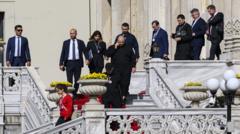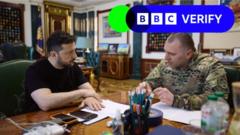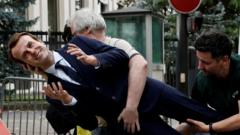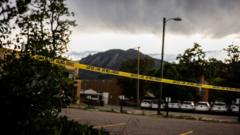At the Shangri-La Dialogue in Singapore, Germany's Chief of Defense, General Carsten Breuer, warned NATO members to prepare for a potential Russian attack by 2029, asserting a significant military buildup in Russia could pose a direct threat to the Baltic states. Breuer highlighted the importance of unity among NATO nations, despite differing views from Hungary and Slovakia, and called for increased military readiness and investments.
German Defense Chief Warns of Potential Russian Attack on NATO by 2029
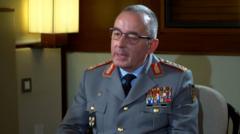
German Defense Chief Warns of Potential Russian Attack on NATO by 2029
General Carsten Breuer emphasizes the urgency for NATO nations to bolster their defenses against a growing Russian threat, with a possible attack anticipated within the next four years.
Germany's Chief of Defense, General Carsten Breuer, has raised concerns about a potential attack from Russia on NATO member states within the next four years. Speaking at the Shangri-La Dialogue in Singapore, Breuer noted that Russia is accelerating its military production, with projections estimating the production of hundreds of tanks annually. He asserted that this military buildup could culminate in an assault on NATO's Baltic states by 2029, but cautioned that such an event could occur even sooner.
The remarks come ahead of an upcoming NATO summit in The Hague, where alliance members are expected to discuss defense strategies and budgets. Breuer described the current threat level from Russia as unprecedented in his four decades of service, pointing out that the country is not only arming for the ongoing conflict in Ukraine but also stockpiling weapons for a possible confrontation with NATO.
The General specifically referenced the Suwalki Gap, a strategic area bordering Lithuania, Poland, Russia, and Belarus, as highly vulnerable. He emphasized that the perspectives on the Russian threat vary significantly across Europe, illustrated by the Estonian analogy of being near a wildfire compared to a distant view from Germany. This highlights the urgency for NATO members to enhance their defense capabilities in light of the growing menace posed by Russia.
Breuer detailed examples of Russian actions that suggest an ongoing broader conflict with NATO, including cyberattacks on European transport systems and attacks on undersea cables. He called on NATO nations to build up their military readiness, insisting on the need for immediate action to ensure collective defense capabilities against any Russian aggression.
Despite concerns about cohesion within NATO due to differing approaches among member nations, including Hungary and Slovakia's closer ties with Moscow, Breuer affirmed the alliance's unity. He pointed out the quick accession of Finland and Sweden to NATO since the onset of the Ukraine conflict as evidence of this collective resolve. Furthermore, he emphasized that there is a growing recognition across NATO states for the necessity of enhancing defense and deterrence measures.
The grim reminder of the looming Russian threat aligns with shifting attitudes in Germany regarding defense spending. Following years of reduced military investment, there is now momentum for a renewed focus on defense, even gaining support from the traditionally pacifist Green Party in recent legislative votes.
While military leaders express readiness for potential conflict, challenges remain regarding the pace at which European military production can scale to match Russian output. Additionally, the U.S. presents its own set of concerns as it shifts its defense priorities towards the Indo-Pacific region, raising questions about how prepared NATO truly is to face the challenges ahead.










